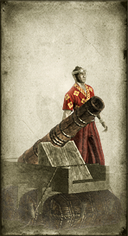
Basic Unit Statistics (can be modified by difficulty level, arts, skills, traits and retainers)
| Recruitment Cost | 250 | |
| Upkeep Cost | 100 | |
| Melee Attack | 2 | 5% |
| Charge Bonus | 4 | 8% |
| Bonus vs Cavalry | 0 | 0% |
| Range | 500 | 76% |
| Accuracy | 10 | 10% |
| Reloading Skill | 10 | 10% |
| Ammunition | 8 | 10% |
| Melee Defence | 2 | 5% |
| Armour | 1 | 6% |
| Morale | 2 | 4% |
Strengths & Weaknesses
- Poor accuracy and slow reload rate.
- Very low amount of ammunition.
- Good damage against buildings.
- Very weak in melee.
- Very weak against cavalry.
- Low morale.
Description
Wooden guns: apparently absurd, and yet deadly too.
Wooden cannons are, as the name suggests, made of wood. This makes them somewhat ramshackle in their operations, with a slow reload rate. They also have poor accuracy, if only because the barrel is warped every time the piece is fired. Not many rounds can be safely fired from a wooden cannon before it must be considered useless or even lethal to its crew. The small numbers of crew mean that it is vulnerable in close combat, and the men suffer low morale through being expected to man such a dubious weapon. It does, however, do a reasonable amount of damage against buildings. Wood leaves a good deal to be desired as a material for gun barrels, apart from the fact that it is exceptionally cheap. Wooden barrels, inevitably, split sooner or later in use, peppering the gun crew with lethal splinters; added to their poor accuracy, it made them a desperate measure for any general. Oddly, the most effective wooden guns created in the nineteenth century were the least lethal: they were actually incapable of killing anyone! In the American Civil War "Quaker guns" (Quakers would not kill, and neither would these guns) were made entirely of wood, as they were only logs carefully painted to look like iron and mounted on limbers to simulate artillery pieces. As tools of deception Quaker guns were extremely successful. Confederate generals regularly used them to deceive their Northern opponents into thinking that their positions were highly fortified, often retreating and leaving the logs-as-guns to carry on the defence!